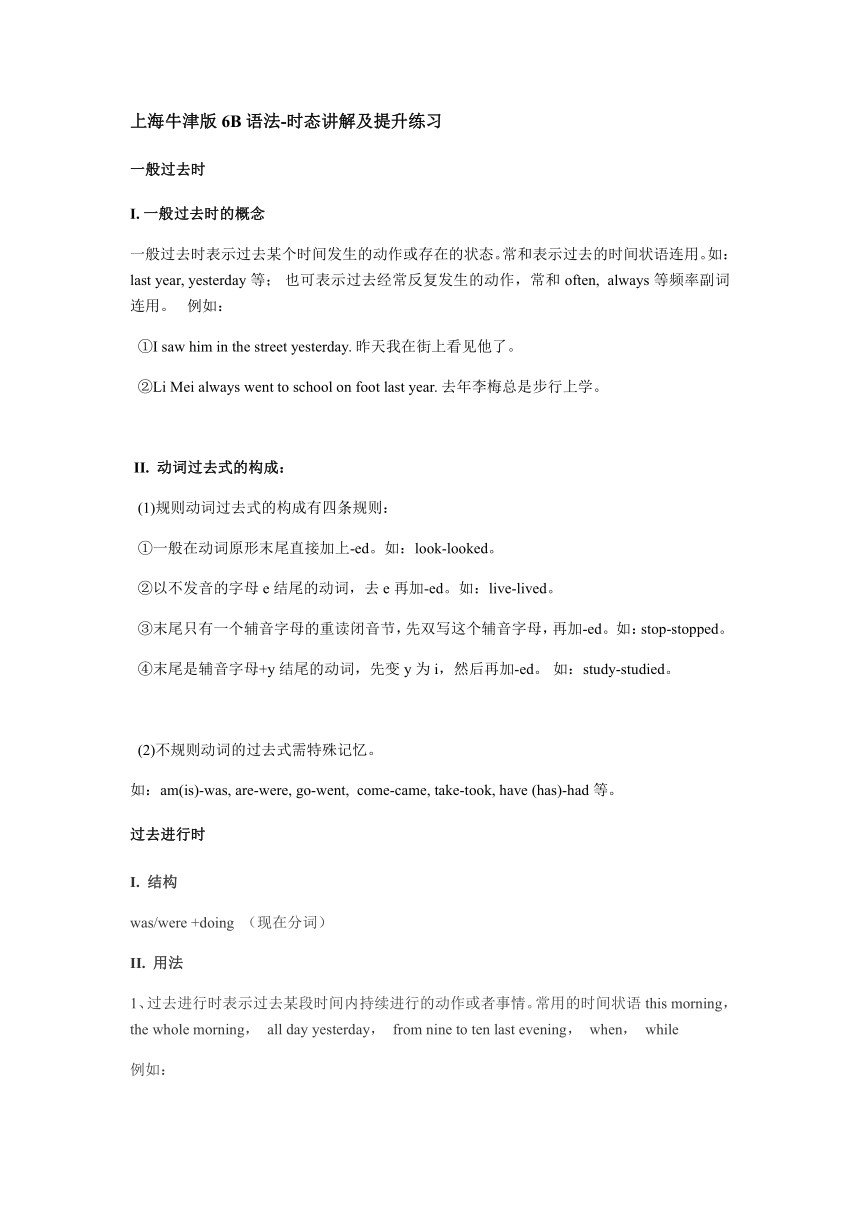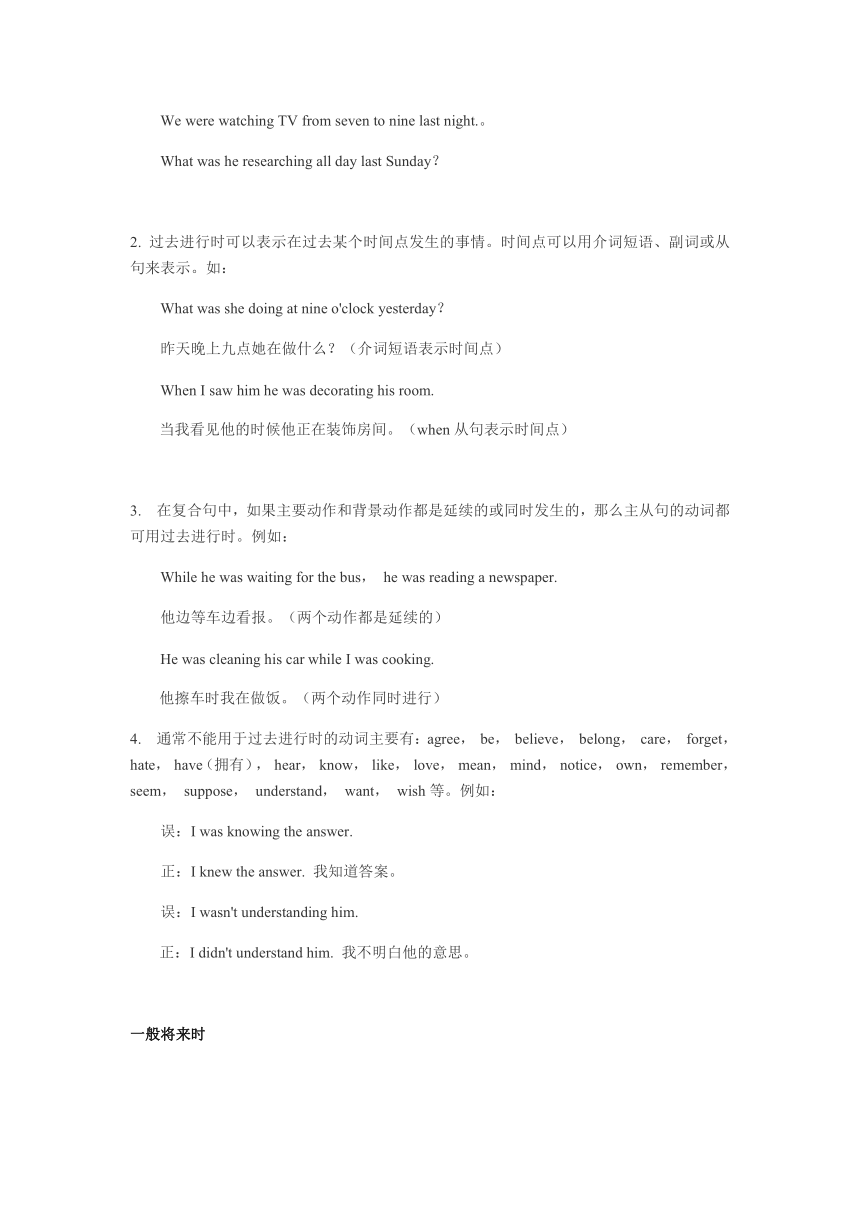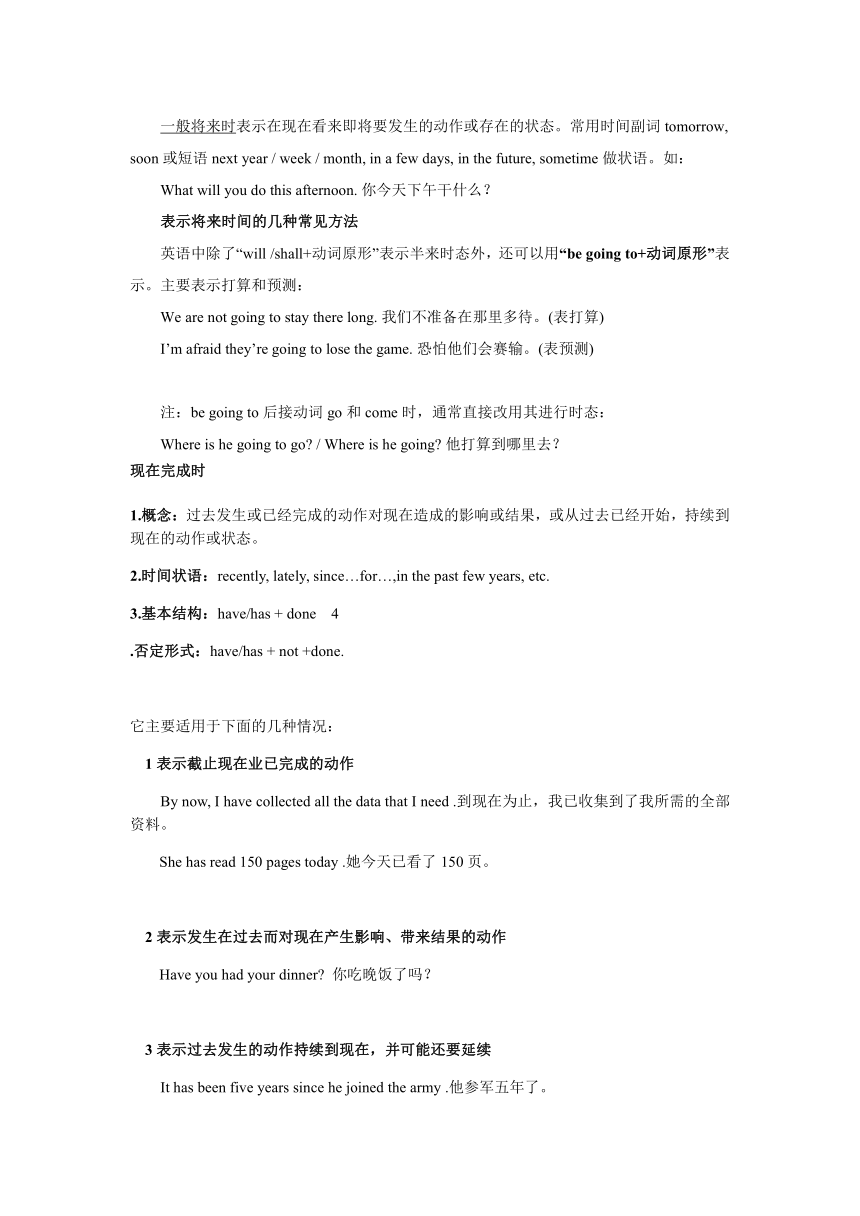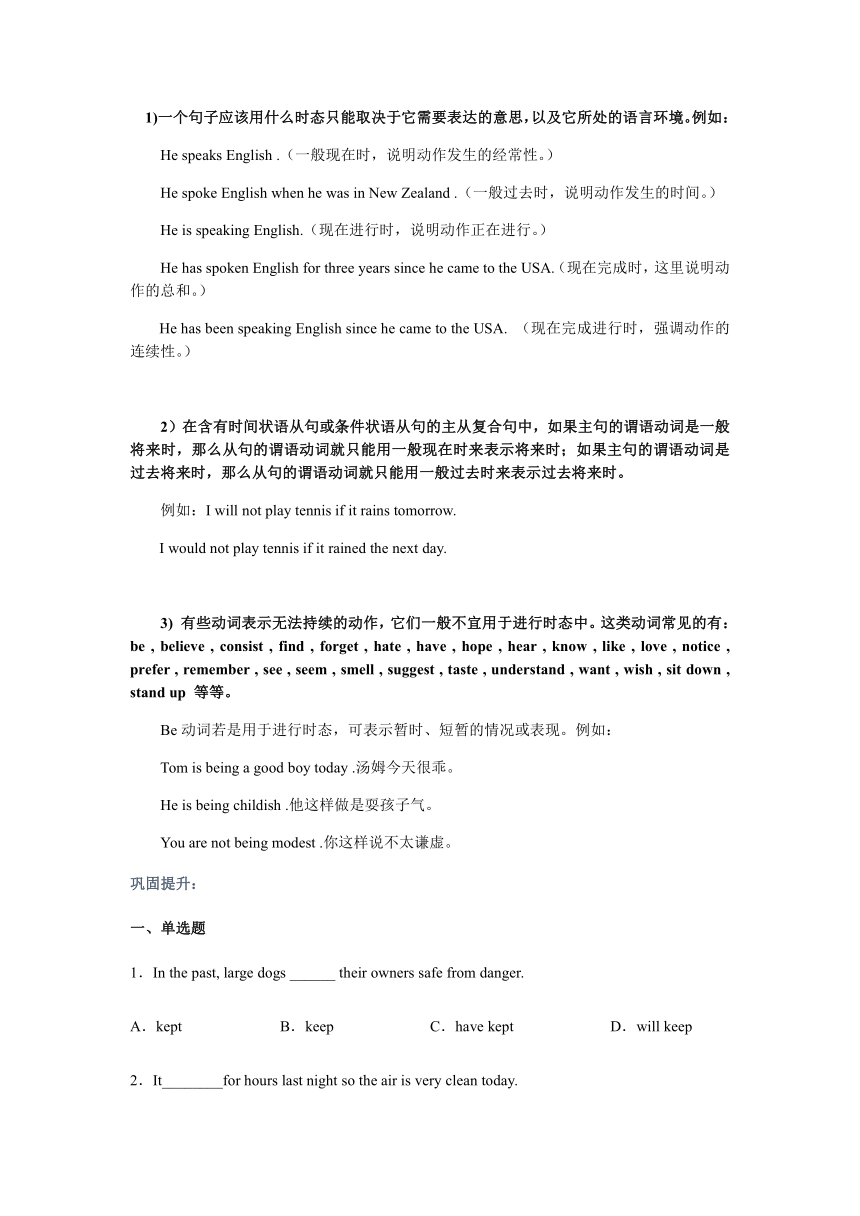2020-2021学年牛津上海版六年级下册语法-时态讲解及提升练习(有答案)
文档属性
| 名称 | 2020-2021学年牛津上海版六年级下册语法-时态讲解及提升练习(有答案) |

|
|
| 格式 | docx | ||
| 文件大小 | 19.6KB | ||
| 资源类型 | 教案 | ||
| 版本资源 | 牛津上海版(试用本) | ||
| 科目 | 英语 | ||
| 更新时间 | 2021-03-21 15:53:33 | ||
图片预览




文档简介
上海牛津版6B语法-时态讲解及提升练习
一般过去时
I.?一般过去时的概念?
一般过去时表示过去某个时间发生的动作或存在的状态。常和表示过去的时间状语连用。如:last?year,?yesterday等;?也可表示过去经常反复发生的动作,常和often,??always等频率副词连用。???例如:?
??①I?saw?him?in?the?street?yesterday.?昨天我在街上看见他了。?
??②Li?Mei?always?went?to?school?on?foot?last?year.?去年李梅总是步行上学。??
?II.
动词过去式的构成:?
??(1)规则动词过去式的构成有四条规则:?
??①一般在动词原形末尾直接加上-ed。如:look-looked。?
??②以不发音的字母e结尾的动词,去e再加-ed。如:live-lived。?
??③末尾只有一个辅音字母的重读闭音节,先双写这个辅音字母,再加-ed。?如:stop-stopped。?
??④末尾是辅音字母+y结尾的动词,先变y为i,然后再加-ed。?如:study-studied。?
??(2)不规则动词的过去式需特殊记忆。
如:am(is)-was,?are-were,?go-went,??come-came,?take-took,?have?(has)-had等。
过去进行时
I.
结构
was/were
+doing
(现在分词)
II.
用法
1、过去进行时表示过去某段时间内持续进行的动作或者事情。常用的时间状语this
morning,
the
whole
morning,
all
day
yesterday,
from
nine
to
ten
last
evening,
when,
while
例如:
We
were
watching
TV
from
seven
to
nine
last
night.。
What
was
he
researching
all
day
last
Sunday?
2.
过去进行时可以表示在过去某个时间点发生的事情。时间点可以用介词短语、副词或从句来表示。如:
What
was
she
doing
at
nine
o'clock
yesterday?
昨天晚上九点她在做什么?(介词短语表示时间点)
When
I
saw
him
he
was
decorating
his
room.
当我看见他的时候他正在装饰房间。(when从句表示时间点)
3. 在复合句中,如果主要动作和背景动作都是延续的或同时发生的,那么主从句的动词都可用过去进行时。例如:
While
he
was
waiting
for
the
bus,
he
was
reading
a
newspaper.
他边等车边看报。(两个动作都是延续的)
He
was
cleaning
his
car
while
I
was
cooking.
他擦车时我在做饭。(两个动作同时进行)
4. 通常不能用于过去进行时的动词主要有:agree,
be,
believe,
belong,
care,
forget,
hate,
have(拥有),
hear,
know,
like,
love,
mean,
mind,
notice,
own,
remember,
seem,
suppose,
understand,
want,
wish等。例如:
误:I
was
knowing
the
answer.
正:I
knew
the
answer.
我知道答案。
误:I
wasn't
understanding
him.
正:I
didn't
understand
him.
我不明白他的意思。
一般将来时
一般将来时表示在现在看来即将要发生的动作或存在的状态。常用时间副词tomorrow,
soon或短语next
year
/
week
/
month,
in
a
few
days,
in
the
future,
sometime?做状语。如:
What
will
you
do
this
afternoon.?你今天下午干什么?
表示将来时间的几种常见方法
英语中除了“will
/shall+动词原形”表示半来时态外,还可以用“be
going
to+动词原形”表示。主要表示打算和预测:
We
are
not
going
to
stay
there
long.?我们不准备在那里多待。(表打算)
I’m
afraid
they’re
going
to
lose
the
game.?恐怕他们会赛输。(表预测)
注:be
going
to?后接动词go和come时,通常直接改用其进行时态:
Where
is
he
going
to
go?
/
Where
is
he
going??他打算到哪里去?
现在完成时
1.概念:过去发生或已经完成的动作对现在造成的影响或结果,或从过去已经开始,持续到现在的动作或状态。
2.时间状语:recently,
lately,
since…for…,in
the
past
few
years,
etc.
3.基本结构:have/has
+
done
4
.否定形式:have/has
+
not
+done.
它主要适用于下面的几种情况:
1表示截止现在业已完成的动作
By
now,
I
have
collected
all
the
data
that
I
need
.到现在为止,我已收集到了我所需的全部资料。
She
has
read
150
pages
today
.她今天已看了150页。
2表示发生在过去而对现在产生影响、带来结果的动作
Have
you
had
your
dinner?
你吃晚饭了吗?
3表示过去发生的动作持续到现在,并可能还要延续
It
has
been
five
years
since
he
joined
the
army
.他参军五年了。
1)一个句子应该用什么时态只能取决于它需要表达的意思,以及它所处的语言环境。例如:
He
speaks
English
.(一般现在时,说明动作发生的经常性。)
He
spoke
English
when
he
was
in
New
Zealand
.(一般过去时,说明动作发生的时间。)
He
is
speaking
English.(现在进行时,说明动作正在进行。)
He
has
spoken
English
for
three
years
since
he
came
to
the
USA.(现在完成时,这里说明动作的总和。)
He
has
been
speaking
English
since
he
came
to
the
USA.
(现在完成进行时,强调动作的连续性。)
2)在含有时间状语从句或条件状语从句的主从复合句中,如果主句的谓语动词是一般将来时,那么从句的谓语动词就只能用一般现在时来表示将来时;如果主句的谓语动词是过去将来时,那么从句的谓语动词就只能用一般过去时来表示过去将来时。
例如:I
will
not
play
tennis
if
it
rains
tomorrow.
I
would
not
play
tennis
if
it
rained
the
next
day.
3)
有些动词表示无法持续的动作,它们一般不宜用于进行时态中。这类动词常见的有:be
,
believe
,
consist
,
find
,
forget
,
hate
,
have
,
hope
,
hear
,
know
,
like
,
love
,
notice
,
prefer
,
remember
,
see
,
seem
,
smell
,
suggest
,
taste
,
understand
,
want
,
wish
,
sit
down
,
stand
up
等等。
Be动词若是用于进行时态,可表示暂时、短暂的情况或表现。例如:
Tom
is
being
a
good
boy
today
.汤姆今天很乖。
He
is
being
childish
.他这样做是耍孩子气。
You
are
not
being
modest
.你这样说不太谦虚。
巩固提升:
一、单选题
1.In
the
past,
large
dogs
______
their
owners
safe
from
danger.
A.kept
B.keep
C.have
kept
D.will
keep
2.It________for
hours
last
night
so
the
air
is
very
clean
today.
A.rained
B.is
raining
C.will
rain
D.rains
3.My
brother________a
student
in
this
school
ten
years
ago.
A.was
B.is
C.are
D.were
4.He
usually
________
some
reading
in
the
evening,
but
he
________
sports
yesterday
evening.
A.does,
plays
B.did,
played
C.does,
played
D.does,
is
playing
5.There
_______
a
lot
of
people
in
the
museum
yesterday.
A.is
B.are
C.was
D.were
6.We
________
Xiang
Shan
Park
last
Friday.
We
had
a
wonderful
time.
A.visit
B.visits
C.will
visit
D.visited
7.—
The
bread
is
delicious.
Where
did
you
buy
it?
—
I________it
by
myself.
A.am
making
B.will
make
C.made
8.—
What
did
you
do
last
summer
holiday?
—
I________Qingdao
with
my
family.
A.visit
B.am
visiting
C.visited
9.Jim
began
to
play
football
when
he________very
young.
A.is
B.was
C.were
10.What
did
you
________yesterday?
A.buy
B.bought
C.buying
D.is
buying
11.Most
people
_______when
the
big
earthquake
took
place
in
that
area.
A.are
sleeping
B.were
sleeping
C.slept
D.sleep
12.–Have
you
seen
Mr.
Black
these
days,
Jack?
--Yes,
I
met
him
when
I
________
in
the
street
yesterday.
A.walked
B.was
walking
C.have
walked
D.is
walking
13.---You
were
out
when
I
went
to
your
house
this
morning.
---Oh,
I
_______
for
a
friend
from
England
at
the
airport.
A.was
waiting
B.waited
C.am
waiting
D.have
waited
14.Tom
_____
his
homework
when
I
called
him
last
night.
A.is
doing
B.are
doing
C.were
doing
D.was
doing
15.I
don't
want
to
see
the
film
because
I
________
it
before.
A.haven't
seen
B.saw
C.have
seen
D.didn't
see
16.Ben
______
in
the
hospital
for
two
days
and
then
went
home.
A.is
staying
B.will
stay
C.has
stayed
D.stayed
17.Her
grandparents
________
in
Shanghai
for
about
twenty
years.
A.live
B.have
lived
C.are
living
D.lived
18.---
Have
you
ever
been
to
New
York
city?
---
Yes,
I
_______
there
twice.
It’s
a
modern
city.
A.was
B.will
go
C.have
been
D.had
been
19.You’re
late.
The
film
__________
for
10
minutes.
A.began
B.has
been
on
C.has
begun
D.was
on
20.The
Greens
_________
in
China
since
1999.
They
are
having
a
happy
life.
A.have
lived
B.has
lived
C.are
living
D.lived
21.I
_____
this
book
for
two
weeks.
I
have
to
return
it
now.
A.borrowed
B.have
borrowed
C.kept
D.have
kept
22.—
Where’s
your
father,
Tom?—
He
_________
to
Changsha.
A.goes
B.go
C.has
gone
D.has
been
23.一_______
you
________
any
extra
classes(补习班)for
Maths
and
Physics?
一No,
not
yet.
A.Did…
have
B.Do…
have
C.Have…
had
D.Will…
have
24.The
British
girl
Adele
Adkins________
a
singer
for
eleven
years.
A.has
been
B.was
C.is
D.will
be
25.I
________
that
the
SPCE
needs
some
money
to
take
care
of
animals.
A.heard
B.will
hear
C.was
hearing
D.have
heard
26.Mary's
mother
has
taught
English________.
A.about
twenty
years
ago
B.for
about
twenty
years
C.since
twenty
years
D.twenty
years
before
27.”Don’t
drink
too
much
coke,
Betty.”
“
”
A.I
do
B.I
will
C.I
don’t
D.I
won’t
28.If
it
is
fine
tomorrow,
we
________
there.
A.go
B.will
go
C.are
going
D.went
29.Jane
and
her
friends
________
a
barbecue
in
the
park
next
Monday.
A.have
B.are
going
to
have
C.had
D.is
going
to
have
30.I
don’t
know
if
he
_____
tomorrow.
If
he
______,
please
call
me.
A.will
come,
comes
B.comes,
comes
C.comes,
will
come
D.will
come,
will
come
31.There
a
football
match
between
Class
1
and
Class
2
this
afternoon.
A.is
going
to
have
B.will
hold
C.is
going
to
be
D.will
have
32.Perhaps
there
______
terrible
air
pollution
in
the
next
few
years.
A.will
have
B.will
be
C.is
going
to
have
D.will
be
able
to
33.There
_______
a
volleyball
match
between
Japan
and
China.
A.will
have
B.is
going
to
have
C.will
D.is
going
to
be
34.There
________
a
football
match
between
Class
1
and
Class
2
this
weekend.
A.will
have
B.is
going
to
have
C.is
going
to
be
D.is
going
to
35.I
hope
you
_______
me
how
to
make
scones.
A.is
showing
B.will
show
C.show
D.have
shown
答案
1.A2.A3.A4.C5.D6.D7.C8.C9.B10.A11.B12.B13.A14.D15.C16.C17.B
18.C19.B20.A21.D22.C23.C24.A25.D26.B27.D28.B29.B30.A31.C32.B
33.D34.C35.B
一般过去时
I.?一般过去时的概念?
一般过去时表示过去某个时间发生的动作或存在的状态。常和表示过去的时间状语连用。如:last?year,?yesterday等;?也可表示过去经常反复发生的动作,常和often,??always等频率副词连用。???例如:?
??①I?saw?him?in?the?street?yesterday.?昨天我在街上看见他了。?
??②Li?Mei?always?went?to?school?on?foot?last?year.?去年李梅总是步行上学。??
?II.
动词过去式的构成:?
??(1)规则动词过去式的构成有四条规则:?
??①一般在动词原形末尾直接加上-ed。如:look-looked。?
??②以不发音的字母e结尾的动词,去e再加-ed。如:live-lived。?
??③末尾只有一个辅音字母的重读闭音节,先双写这个辅音字母,再加-ed。?如:stop-stopped。?
??④末尾是辅音字母+y结尾的动词,先变y为i,然后再加-ed。?如:study-studied。?
??(2)不规则动词的过去式需特殊记忆。
如:am(is)-was,?are-were,?go-went,??come-came,?take-took,?have?(has)-had等。
过去进行时
I.
结构
was/were
+doing
(现在分词)
II.
用法
1、过去进行时表示过去某段时间内持续进行的动作或者事情。常用的时间状语this
morning,
the
whole
morning,
all
day
yesterday,
from
nine
to
ten
last
evening,
when,
while
例如:
We
were
watching
TV
from
seven
to
nine
last
night.。
What
was
he
researching
all
day
last
Sunday?
2.
过去进行时可以表示在过去某个时间点发生的事情。时间点可以用介词短语、副词或从句来表示。如:
What
was
she
doing
at
nine
o'clock
yesterday?
昨天晚上九点她在做什么?(介词短语表示时间点)
When
I
saw
him
he
was
decorating
his
room.
当我看见他的时候他正在装饰房间。(when从句表示时间点)
3. 在复合句中,如果主要动作和背景动作都是延续的或同时发生的,那么主从句的动词都可用过去进行时。例如:
While
he
was
waiting
for
the
bus,
he
was
reading
a
newspaper.
他边等车边看报。(两个动作都是延续的)
He
was
cleaning
his
car
while
I
was
cooking.
他擦车时我在做饭。(两个动作同时进行)
4. 通常不能用于过去进行时的动词主要有:agree,
be,
believe,
belong,
care,
forget,
hate,
have(拥有),
hear,
know,
like,
love,
mean,
mind,
notice,
own,
remember,
seem,
suppose,
understand,
want,
wish等。例如:
误:I
was
knowing
the
answer.
正:I
knew
the
answer.
我知道答案。
误:I
wasn't
understanding
him.
正:I
didn't
understand
him.
我不明白他的意思。
一般将来时
一般将来时表示在现在看来即将要发生的动作或存在的状态。常用时间副词tomorrow,
soon或短语next
year
/
week
/
month,
in
a
few
days,
in
the
future,
sometime?做状语。如:
What
will
you
do
this
afternoon.?你今天下午干什么?
表示将来时间的几种常见方法
英语中除了“will
/shall+动词原形”表示半来时态外,还可以用“be
going
to+动词原形”表示。主要表示打算和预测:
We
are
not
going
to
stay
there
long.?我们不准备在那里多待。(表打算)
I’m
afraid
they’re
going
to
lose
the
game.?恐怕他们会赛输。(表预测)
注:be
going
to?后接动词go和come时,通常直接改用其进行时态:
Where
is
he
going
to
go?
/
Where
is
he
going??他打算到哪里去?
现在完成时
1.概念:过去发生或已经完成的动作对现在造成的影响或结果,或从过去已经开始,持续到现在的动作或状态。
2.时间状语:recently,
lately,
since…for…,in
the
past
few
years,
etc.
3.基本结构:have/has
+
done
4
.否定形式:have/has
+
not
+done.
它主要适用于下面的几种情况:
1表示截止现在业已完成的动作
By
now,
I
have
collected
all
the
data
that
I
need
.到现在为止,我已收集到了我所需的全部资料。
She
has
read
150
pages
today
.她今天已看了150页。
2表示发生在过去而对现在产生影响、带来结果的动作
Have
you
had
your
dinner?
你吃晚饭了吗?
3表示过去发生的动作持续到现在,并可能还要延续
It
has
been
five
years
since
he
joined
the
army
.他参军五年了。
1)一个句子应该用什么时态只能取决于它需要表达的意思,以及它所处的语言环境。例如:
He
speaks
English
.(一般现在时,说明动作发生的经常性。)
He
spoke
English
when
he
was
in
New
Zealand
.(一般过去时,说明动作发生的时间。)
He
is
speaking
English.(现在进行时,说明动作正在进行。)
He
has
spoken
English
for
three
years
since
he
came
to
the
USA.(现在完成时,这里说明动作的总和。)
He
has
been
speaking
English
since
he
came
to
the
USA.
(现在完成进行时,强调动作的连续性。)
2)在含有时间状语从句或条件状语从句的主从复合句中,如果主句的谓语动词是一般将来时,那么从句的谓语动词就只能用一般现在时来表示将来时;如果主句的谓语动词是过去将来时,那么从句的谓语动词就只能用一般过去时来表示过去将来时。
例如:I
will
not
play
tennis
if
it
rains
tomorrow.
I
would
not
play
tennis
if
it
rained
the
next
day.
3)
有些动词表示无法持续的动作,它们一般不宜用于进行时态中。这类动词常见的有:be
,
believe
,
consist
,
find
,
forget
,
hate
,
have
,
hope
,
hear
,
know
,
like
,
love
,
notice
,
prefer
,
remember
,
see
,
seem
,
smell
,
suggest
,
taste
,
understand
,
want
,
wish
,
sit
down
,
stand
up
等等。
Be动词若是用于进行时态,可表示暂时、短暂的情况或表现。例如:
Tom
is
being
a
good
boy
today
.汤姆今天很乖。
He
is
being
childish
.他这样做是耍孩子气。
You
are
not
being
modest
.你这样说不太谦虚。
巩固提升:
一、单选题
1.In
the
past,
large
dogs
______
their
owners
safe
from
danger.
A.kept
B.keep
C.have
kept
D.will
keep
2.It________for
hours
last
night
so
the
air
is
very
clean
today.
A.rained
B.is
raining
C.will
rain
D.rains
3.My
brother________a
student
in
this
school
ten
years
ago.
A.was
B.is
C.are
D.were
4.He
usually
________
some
reading
in
the
evening,
but
he
________
sports
yesterday
evening.
A.does,
plays
B.did,
played
C.does,
played
D.does,
is
playing
5.There
_______
a
lot
of
people
in
the
museum
yesterday.
A.is
B.are
C.was
D.were
6.We
________
Xiang
Shan
Park
last
Friday.
We
had
a
wonderful
time.
A.visit
B.visits
C.will
visit
D.visited
7.—
The
bread
is
delicious.
Where
did
you
buy
it?
—
I________it
by
myself.
A.am
making
B.will
make
C.made
8.—
What
did
you
do
last
summer
holiday?
—
I________Qingdao
with
my
family.
A.visit
B.am
visiting
C.visited
9.Jim
began
to
play
football
when
he________very
young.
A.is
B.was
C.were
10.What
did
you
________yesterday?
A.buy
B.bought
C.buying
D.is
buying
11.Most
people
_______when
the
big
earthquake
took
place
in
that
area.
A.are
sleeping
B.were
sleeping
C.slept
D.sleep
12.–Have
you
seen
Mr.
Black
these
days,
Jack?
--Yes,
I
met
him
when
I
________
in
the
street
yesterday.
A.walked
B.was
walking
C.have
walked
D.is
walking
13.---You
were
out
when
I
went
to
your
house
this
morning.
---Oh,
I
_______
for
a
friend
from
England
at
the
airport.
A.was
waiting
B.waited
C.am
waiting
D.have
waited
14.Tom
_____
his
homework
when
I
called
him
last
night.
A.is
doing
B.are
doing
C.were
doing
D.was
doing
15.I
don't
want
to
see
the
film
because
I
________
it
before.
A.haven't
seen
B.saw
C.have
seen
D.didn't
see
16.Ben
______
in
the
hospital
for
two
days
and
then
went
home.
A.is
staying
B.will
stay
C.has
stayed
D.stayed
17.Her
grandparents
________
in
Shanghai
for
about
twenty
years.
A.live
B.have
lived
C.are
living
D.lived
18.---
Have
you
ever
been
to
New
York
city?
---
Yes,
I
_______
there
twice.
It’s
a
modern
city.
A.was
B.will
go
C.have
been
D.had
been
19.You’re
late.
The
film
__________
for
10
minutes.
A.began
B.has
been
on
C.has
begun
D.was
on
20.The
Greens
_________
in
China
since
1999.
They
are
having
a
happy
life.
A.have
lived
B.has
lived
C.are
living
D.lived
21.I
_____
this
book
for
two
weeks.
I
have
to
return
it
now.
A.borrowed
B.have
borrowed
C.kept
D.have
kept
22.—
Where’s
your
father,
Tom?—
He
_________
to
Changsha.
A.goes
B.go
C.has
gone
D.has
been
23.一_______
you
________
any
extra
classes(补习班)for
Maths
and
Physics?
一No,
not
yet.
A.Did…
have
B.Do…
have
C.Have…
had
D.Will…
have
24.The
British
girl
Adele
Adkins________
a
singer
for
eleven
years.
A.has
been
B.was
C.is
D.will
be
25.I
________
that
the
SPCE
needs
some
money
to
take
care
of
animals.
A.heard
B.will
hear
C.was
hearing
D.have
heard
26.Mary's
mother
has
taught
English________.
A.about
twenty
years
ago
B.for
about
twenty
years
C.since
twenty
years
D.twenty
years
before
27.”Don’t
drink
too
much
coke,
Betty.”
“
”
A.I
do
B.I
will
C.I
don’t
D.I
won’t
28.If
it
is
fine
tomorrow,
we
________
there.
A.go
B.will
go
C.are
going
D.went
29.Jane
and
her
friends
________
a
barbecue
in
the
park
next
Monday.
A.have
B.are
going
to
have
C.had
D.is
going
to
have
30.I
don’t
know
if
he
_____
tomorrow.
If
he
______,
please
call
me.
A.will
come,
comes
B.comes,
comes
C.comes,
will
come
D.will
come,
will
come
31.There
a
football
match
between
Class
1
and
Class
2
this
afternoon.
A.is
going
to
have
B.will
hold
C.is
going
to
be
D.will
have
32.Perhaps
there
______
terrible
air
pollution
in
the
next
few
years.
A.will
have
B.will
be
C.is
going
to
have
D.will
be
able
to
33.There
_______
a
volleyball
match
between
Japan
and
China.
A.will
have
B.is
going
to
have
C.will
D.is
going
to
be
34.There
________
a
football
match
between
Class
1
and
Class
2
this
weekend.
A.will
have
B.is
going
to
have
C.is
going
to
be
D.is
going
to
35.I
hope
you
_______
me
how
to
make
scones.
A.is
showing
B.will
show
C.show
D.have
shown
答案
1.A2.A3.A4.C5.D6.D7.C8.C9.B10.A11.B12.B13.A14.D15.C16.C17.B
18.C19.B20.A21.D22.C23.C24.A25.D26.B27.D28.B29.B30.A31.C32.B
33.D34.C35.B
同课章节目录
- Module 1 City life
- Unit 1 Great cities in Asia
- Unit 2 At the airport
- Unit 3 Dragon Boat Festival
- Unit 4 Staying healthy
- Module 2 Changes
- Unit 5 What will I be like?
- Unit 6 Seasonal changes
- Unit 7 Travelling in Garden City
- Module 3 The nature world
- Unit 8 Windy weathe
- Unit 9 Sea water and rain wate
- Unit 10 Forests and land
- Unit 11 Controlling fire
